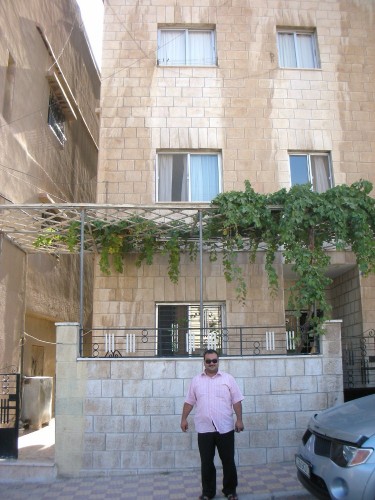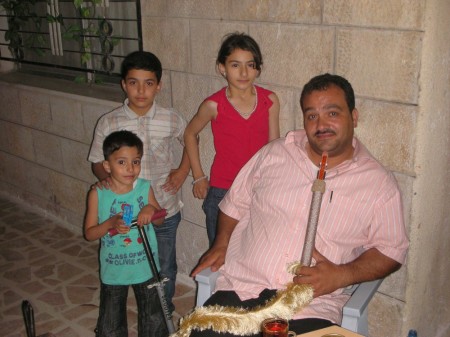Sa’eed yohm al-Istiqlal! Or as we’d say it, Happy Independence Day! Jordan celebrated its own independence from Britain on May 25th while I was off in Tajikistan, but from what I’ve been told, they do much the same as America does, except with more cannons. I wish I’d seen that one – or heard it! To celebrate America’s 233rd birthday while thousands of kilometers from home, Aaron arranged a party at my house for all of our expatriate American (and other) friends and colleagues.
It was a great success; beer, beef/chicken/pork available, and Aaron managed to avoid blowing off his head with fireworks, or setting my house on fire when he was shooting foot-long Roman Candles off of my roof. Although, of course, when everything is made out of cement and concrete like it is here, it’s probably somewhat difficult to actually start a dangerous fire. Something tells me that the Amman Fire Department probably doesn’t get many calls; if one even exists.
As I’ve mentioned before, fireworks are a common sight here in the city – they’re always set off for weddings and now, in the summer, for graduation parties as well. Here on the top of Jebel Amman, I can always see at least 4-5 sets per night lit off somewhere in the city spread out to the south. However, that didn’t stop the neighbor children from lining up out on the sidewalk in front of the house to stare, mouths agape, at Aaron’s pyrotechnics, and shriek madly with every gunshot-like report. However, it’s just as likely that they were equally intrigued by the large number of foreign women present outside under the fig tree – possibly an unusual gathering here in central Amman.
A few weeks ago, Khalil had suddenly turned to me at work and asked me why, after all my months working with him in Jordan, I had never been to his house for dinner. I told him to name a date and I’d be there, so we decided on July 4th, the day after our Istiqlal-party. He picked me up and drove me across town to yet another one of the dozens of Jebels that the entire city is built across. As always, the weather was blindingly sunny and cloudless, and I could see for kilometers from the top of this mountain, all the way back to Jebel Amman and the Royale Hotel (momentarily visible there in the previous video) that is next to my house. Huge and cylindrical, the hotel makes a perfect landmark.
Khalil welcomed me to his apartment building, although a better name for it would be “domicile for the entire extended family.” From what I could decipher from Arabic into English, the house had started as one (or two) floors for his parents and his seven brothers, but in the decades since it has expanded into an entire apartment building for all 9 families. The idea of family in the Arab world is entirely more personal than it is in the West. In America, it’s considered a normal, if painful part of life for the family to disperse and the parents to eventually be put into a nursing home. Here, however, it would be a gross embarrassment for your parents to be put in a home, and socially it would be like wearing a sign that says “I am a disgraceful, incompetent son.” Likewise, few Arab young men have any interest in leaving home and striking out on their own – Haitham, for example, gave me a skeptical look when I asked him about this and said, “but who would take care of my parents if I left?” Khalil and his brothers, their wives, and the combined total of ~15 nieces and nephews make sure that their matriarch will never, ever have to worry about a single thing; they treat her like a queen.
I was introduced to Khalil’s three beautiful children, Mohammad, Marwan, and Rama, the eldest child and only daughter. Rama, like most Arab children and especially females, was extremely shy for the first half hour and barely peeked around the door of the sitting room where Khalil and I sat and talked. Her two younger brothers, the solemn-faced 8-year-old Marwan and the excitable 5-year old Mohammad. Marwan was extremely serious and laid back, sitting on the plush couch in the “visitor’s room” across from his father and listening carefully to everything that Khalil and I would say to each other. Meanwhile, little Mohammad climbed all over Khalil and his couch while bouncing up and down on his shoulders, openly peering at me with wide eyes.
Like all Arab houses, the Khalil’s apartment has a large main room for dining and entertaining visitors, with the best of everything – lines from the Qur’an hung in pictures around the room, a picture of his late father, and plush curtains and hangings in every window. My eye spotted an odd thing in the otherwise richly-furnished room: a wall-mounted singing bass. You know, one of the ones that you walk in front of, and then its head and tail start to twist and gyrate and it painfully screeches out some folkish tune. Thankfully for all of us, the batteries in it had long since died, and judging from the level of corrosion on the contacts, it was debatable as to whether it would ever work again (the Arab world doesn’t deserve the Singing Big-Mouth Bass). I asked Khalil where he had found a gem like this, and he shrugged and told me it was from Saudi. Although he hasn’t worked there for several years, at least five or six of his brothers have jobs in the country in engineering and construction-related fields.
The dinner, prepared by Khalil’s wife and brought to us by Rama, was a delicious spread of grilled Sultan fish and roasted chicken. As I’ve now come to expect with Muslim families, Rama and her mother ate elsewhere, while the four men ate in the visitor’s room. Khalil proudly proclaimed that all the food on the table was for me, and personally spent more time watching me and refilling my glass and plate than eating himself. Mohammad sat to my right and gazed at me raptly, barely chewing. Finally, he asked me in a hushed whisper if I loved Satan. Khalil dropped his fish and looked up at him sharply and Marwan gave his younger brother a scandalized look. Mohammad followed up by asking me if I was Satan’s friend and if I lived with him in hell, enjoying the reaction from his brother and father. I was amused and tried to explain to him in my broken Arabic the similarities between Christianity and Islam, which Marwan keenly noted and quizzed me on just how devout a Christian I was. Khalil firmly reprimanded the boy, telling him that he was embarrassing him and not to ask such silly questions. Finally, Mohammad asked the table at large if Satan loved God, and Khalil rolled his eyes skyward and plaintively asked Allah why his son persisted in asking such things to a guest. I repeatedly told my friend that I wasn’t bothered by the questions, but after that point Khalil was definitely asking Mohammad to get more things from the kitchen for the rest of the meal, as if to keep him from focusing on me too much.
Afterward Khalil led me back downstairs to the veranda overlooking the main street outside his home, where several of his brothers were returning from their 10-month stint in Saudi to be with their children in the much-more-comfortable Jordan summer. I met all five of Khalil’s brothers who had come back to Jordan; the other two were still in Saudi for the time being. The evening was filled with the sounds of shrieks of laughter and games from cousins playing in the patio and in the street as their fathers and I watched contentedly from the shade created for us by dozens of overhanging grape vines. Each father in turn took great pride calling over his children from the group, presenting them to me and having them demonstrate the results of their English lessons for me to rate. Like Rama, the girls were highly embarrassed by this and most of them hid behind their fathers’ chairs, but all seemed to love the attention and were happy to answer the quizzes that Marwan I, Mohammad I, Ibrahim, Mahmoud, and Wahleed gave them. One of the girls was even able to sing most of “I’m a Little Teapot” to me, to which I applauded heartily. Rama, being one of the oldest and much braver now that she was surrounded by her younger cousins, boldly strode up to me and greeted me in whole sentences, welcoming me to the family home. I thanked her in return and told her that it was her responsibility to help her father learn as much as she was in school, causing her to blush furiously and her uncles to laugh uproariously at their elder brother. Khalil chuckled and nodded sagely; the patriarch of the family surrounded by his flock. One of Marwan’s daughters, goaded by whispered nudges from her playmates, came right up to me, shook my hand firmly while saying “Howareyou,” and then pulled me down to her diminutive height and kissed me on both cheeks like she’d seen Marwan do when he greeted me, causing everyone to once again break up with shouts of laughter and pat the little girl on the head as she beamed proudly and skipped back off to the others and Rama, who looked a little put out.
The seven of us sat around the little table for several hours, smoking argeilleh/cigarettes, drinking juice and watching the children play – talking in mostly Arabic and only a little English. Although I was definitely able to hold my own in the language, it was good to have Ibrahim there to help, because as an architectural engineer he spoke English with semi-fluency. They all marveled at how quickly I’d learned Arabic and told Khalil that he should figure out the methods I was using and try them himself. Khalil pulled on his argeilleh thoughtfully and said that Jeff had been trying to teach him for years but nothing seemed to stick. I showed them my qomoos (dictionary) on my iPod and told Khalil that writing was the key, to which he vowed to be a little more proactive in his education then merely jotting a word or two on a whiteboard at Entity Green.
Mohammad went back with us when I was dropped back off at home. He stood in the backseat between the two front seats and his little eyes struggled between falling asleep and staying open at the excitement of the city around him. I asked him if he minded that I was a Christian, and he ducked his head and bashfully murmured that I was a good guy. I told Khalil that he should bring his kids to Ayn al Basha more often so they have more experience with Western foreigners and Iraqis. I think that everyone would love to meet them – as long as they don’t mind a little interrogation from young Mohammad!




Wonderful story, kiddo! I loved hearing about the kids and their reaction to you — made me think of the boys you encountered at the wedding celebration near Irbid. Someone’s apparently been telling tall tales to little Mohammad of scary non-Muslims — it’s great that he now has you as an example of a “good guy” Christian!
Having now seen the Arab way, your mom & I are looking forward to you & Josh taking good care of us in our dotage! (Wouldn’t be hard to beat the standard of care Grandma’s getting at Oakwood!)